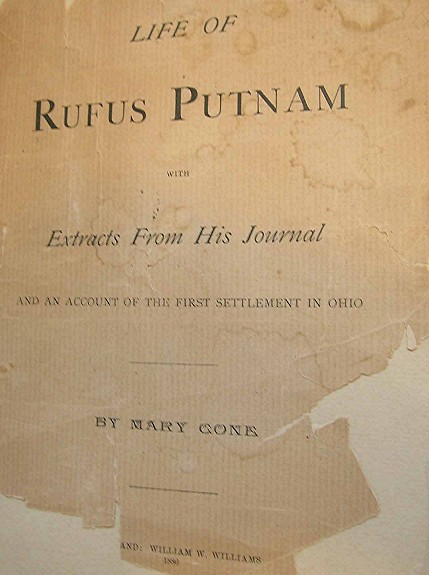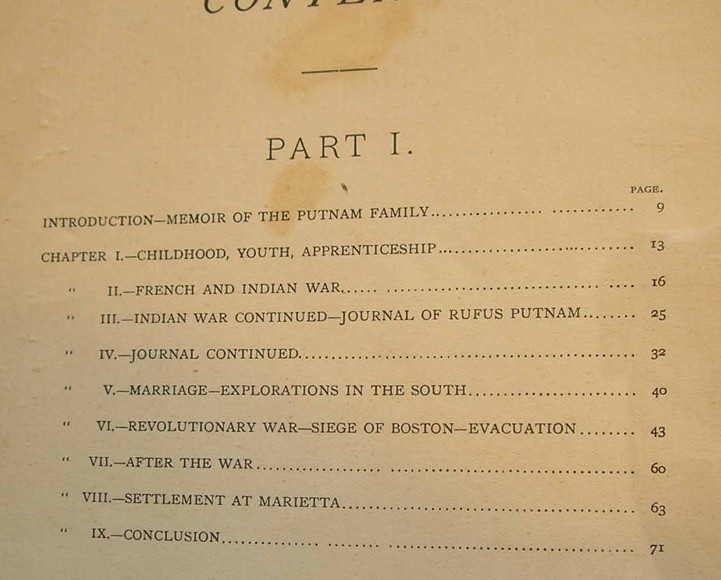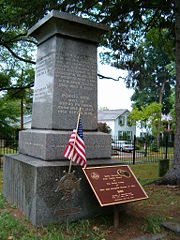Chapter V - MARRIAGE—EXPLORATIONS IN THE SOUTH
After the war was over, Mr. Putnam went back to building mills, farming, etc., in which work he continued for seven or eight years. During this time he was industriously adding to his stock of knowledge, making a specialty of practical surveying, in which he was greatly helped by Mr. Timothy Dwight. He was, at length, sufficiently master of the business to devote himself almost exclusively to it. He was employed by the landholders of the neighboring towns, and by his accuracy and faithfulness gave such satisfaction to his employers that his services were much sought after.
In 1761 Mr. Putnam was married to Elizabeth Ayres, daughter of William Ayres of Brookfield. But his dream of domestic happiness was very brief, and the awaking there from was terrible. The wife died in less than a year after their marriage, and in a few short months their infant son was laid beside the mother. Mr. Putnam says in his journal, “Thus was I in less than a year deprived of mother and child, and in them, as I then thought, of all earthly comfort.” To him this early disappointment must have been very hard to bear, for until then he had really had no home. But time, the great consoler, brought him relief; and in January, 1765, he was married to Persis Rice, daughter of Zebulon Rice of Westborough.
In 1772, Mr. Putnam engaged in an enterprise that at the time excited a good deal of interest in New England, though the outcome thereof was disappointment.
Soon after the close of the French and Indian war, General Lyman was sent to England by a number of colonial officers and soldiers, in order to secure from the British government a grant of land as a reward for military service performed during the late war. He was detained there several years in vain endeavor to obtain that for which he went. He returned in 1772. A meeting of “the Military Adventurers” was called in Hartford, and General Lyman assured those concerned that an order had been passed by the king in council, authorizing the governor of “West Florida” to grant lands in that province to the officers and soldiers who had served in the late war, in the same manner and proportion as had been done to his majesty’s regular troops. As they had been liberally provided for in the provinces acquired during the war, the prospect seemed good that the colonial officers and soldiers would also reap a reward for duties well done. To be sure, General Lyman brought no written vouchers to make the grant sure, but a king’s word was thought to be sufficient to form a basis of expectation and of action. The company, therefore, appointed a committee to explore the country and lay out the tracts to be divided among the adventurers. Colonel Israel Putnam and his younger relative, Rufus Putnam, were two of the committee.
The associates of the military company chartered a sloop, in which the exploring party sailed from New York, January 10, 1773. They entered the bay of Pensacola, March 1. Governor Chester and his council treated them kindly, but were obliged to say that no order for granting lands to the Continentals had been received. This was discouraging; still there was left the hope that some untoward event had caused delay, and the order might yet come. At any rate, after the long voyage, they could not be reconciled to the idea of returning without accomplishing something; so the committee set about their explorations. Mr. Putnam left, among his papers, a carefully drawn plan of the Mississippi river, with all its windings and eccentricities to the mouth of the Yazoo, which was the extent of their journeyings in that direction. They went up the Yazoo twenty or thirty miles, when they concluded that they had reached the northern boundary of West Florida. The explorers returned to Pensacola early in July, and waited upon the governor to see if the expected order had been received during their absence. No such order had arrived, but the delay was not considered conclusive, and Governor Chester took the responsibility of making an offer of lands upon terms so satisfactory that,upon the whole, it was thought advisable to attempt to make a settlement. Accordingly, when the committee returned to Massachusetts, their report was so favorable, in regard to soil, climate and conditions of the country they had been sent out to investigate, that several hundred families from Massachusetts and other parts of New England embarked for West Florida, there to make for themselves new homes. But, unfortunately for their hopes and prospects, Governor Chester received, in October, positive orders from the crown prohibiting him from granting or selling any more lands upon any conditions whatsoever until the king’s further pleasure should be signified. Thus the land office was closed to the poor emigrants when they reached the place where they expected to find homes. Some had spent all they had in getting there, and it was too late in the season for them to return, even if they had the means. The governor kindly allowed them to take possession of any unoccupied lands they could find, but the colony did not prosper. On account of change of climate, exposure and hardships, many of the colonists sickened and died, and there were very few to whom the issue was beneficial.
Mr. Putnam was occupied more than eight months in these explorations, for his time and services, and to cover expenses withal, he received the munificent sum of eighty dollars!



